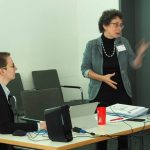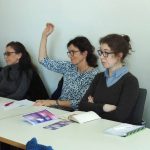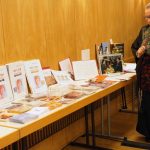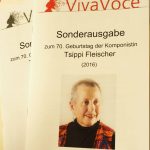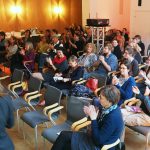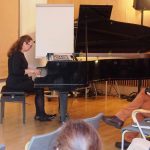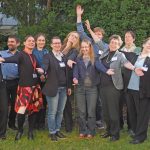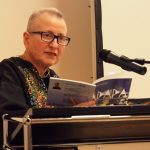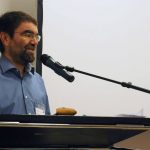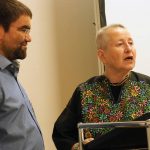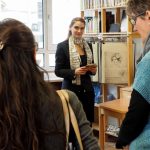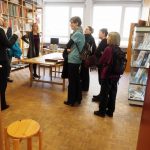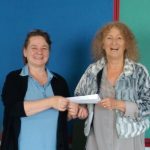On 30 October, 2016, we celebrated a truly great day in our archives. The event began by welcoming approximately 30 guests who had traveled from all over Germany – including one of the founding members of the Internationaler Arbeitskreis Frau und Musik, Siegrid Ernst – by the Board of Directors, Dr. Vera Lasch and Mary Ellen Kitchens.
Unfortunately, Dr. Eva Weissweiler dropped out due to illness, so Mary Ellen Kitchens and Susanne Wosnitzka took over her speaking time. In their presentation Breakthrough or Fad? How Do We Anchor the Integration of Women Composers and Conductors In the Music Business, they vividly illuminated the developments, current activities, and findings from this year and the last on women in the music business, using chronological landmarks and statistics: Where did we stand two years ago, where does the music world stand today, and where can it stand in two years if we all continue in this way with our lobbying work?
The audience was asked to name and justify the positive developments that were most central to them, and thus addressing and discussing work focused on their own areas. These were in particular the areas of school education, as well as support of female composers and conductors as visible role models.
One of the main topics of the general meeting, which took place after the opening lecture, was the ongoing extremely difficult financial situation of the archive, which is especially affecting our institutional work. Together we are working on solutions the annual meeting of the i.d.a. umbrella organization took place the day before, and Mary Ellen Kitchens as well as our staff member Daniela Weber attended, and were thus able to get to know the Bayenturm in Cologne as well as the emma editorial staff and Alice Schwarzer personally. In an exchange with the staff of other women’s archives, current events such as inclusive funding measures in the context of the realization of the German Digital Women’s Archive (DDF, Berlin) were discussed.
At the end of the Annual General Meeting, Dr. Vera Lasch was presented with a donation of € 400 by the board of the Frankfurt Tonkünstlerverband – represented by Dietburg Spohr and Heike Matthiesen – which had been collected as proceeds from a benefit concert (25 Years of German Unity – Music by Composers from the FRG and the GDR, June 2015). We thank you from the bottom of our hearts!
Accompanying the open members’ meeting, those interested were given a guided tour of the premises and an insight into the archive’s holdings. A joint lunch provided space for further important exchange and networking.
In the afternoon, Margarita Feinstein delighted the audience with her subtle and powerful performance of music by Jewish women composers, or music conceived as Jewish. The programme ranged from Clara Schumann’s Le Sabbat, the Polonaise in F minor by Maria Szymanowska, the Haiku by Ekaterina Tschemberdschi, the Gambrinus by Ludmilla Zhubinskaya, to the work In Chromatic Mood by Tsippi Fleischer, which simultaneously led into the highlight of the day, the German premiere of her new video opera Adapa. Archive staff member and church musician Matthias Gerhold introduced the Haifa-born composer, and provided insight into her work. Ms Fleischer, who celebrated her 70th birthday this year, had travelled to Germany especially for the presentation of her new work.
The work, made up of strong visual impressions such as desert and sea images, mixed with memorable sonic experiences, brilliantly opened up Tsippi Fleischer’s instrumental possibilities: “We should not be sad about the fact that we lost eternal life, because death inspires our life very actively” is the keynote of the video opera’s message:
“The monumental cast of three large choirs with extraordinarily dramatic entries, a large orchestra, and various soloists, symbolises the idea of “carpe-diem”. The ‘pictorial quality’ and the use of modern media also exude grandeur: for example, the stage set is designed with computer technology. The use of exotic elements, characteristic of Fleischer’s work, is particularly reflected in the musical design – through the manifold recourse to quarter tones.” (Excerpt from the programme booklet, translated from German to English.)
Following the acclaimed performance, which was also attended by two vocal soloists from the Adapa recording, a lively discussion developed with Tsippi Fleischer. The special edition of VivaVoce on her life and work was quickly sold out, and a reprint was immediately ordered.
“As always, we enjoyed this conference full of energy and inspiration. Thanks to all the helpers.” (Siegrid Ernst)
“Thank you very much for this enriching day!” (Renate Küchler)
“Many thanks for the extremely competent guided tour of the music archive by Ms Brendel.” (Sylva Bouchard-Beier)
We thank all our supporters, as well as the many helping hands that made this day possible!

